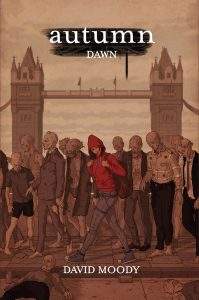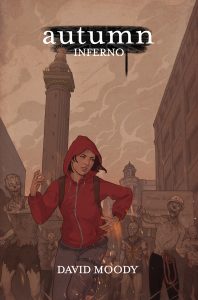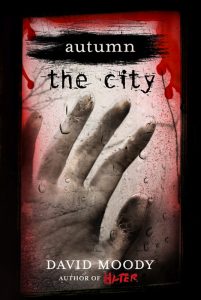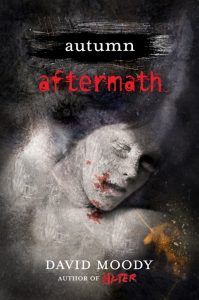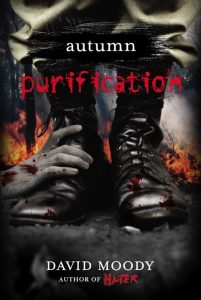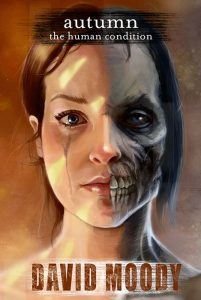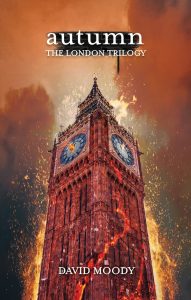Duck and Cover
Councillor Ray Cox never wanted this level of responsibility. He went into local politics for the social status, the financial benefits and the personal perks, never to actually try and help anyone.
Things have suddenly changed.
The population of Taychester has been wiped out, and Ray’s the only council member left alive. And now the hundreds of thousands of undead Taychester residents are looking towards him for answers…
Councillor Ray Cox had never wanted this level of responsibility. He worked in local government purely for the social status and financial implications, not any other reason. Overpaid and underworked, he’d sat in the shadows at the back of the council chambers for years, doing all he could not to be noticed, except when it was in his interest to be seen and heard. It was a sad indictment of the apathy of his constituents that he had been elected, then re-elected, without actually having done very much for them at all. It had been different to begin with, of course. In the early days he’d tried to make an impression, to be somebody. But the novelty of office had quickly worn off. Ray’s priorities changed and his prime concerns became lining his own pockets and claiming back as much food, entertainment and travel costs as he could. Serving the community had long been forgotten: never completely ignored, but usually conveniently overlooked and put to one side. In the space of a single devastating day, however, everything in Ray’s world was turned on its head.
Working with the council leaders had stood Ray in good stead, both financially and on a personal level. He’d made a few very public mistakes a couple of years back, getting himself mixed up in an ill-considered and wholly inappropriate (borderline illegal) business deal. His friends in high places had seen him okay. They found him a modest little office at the far end of a particularly long corridor and gave him responsibility for the borough’s tennis courts and football pitches and various other public amenities which tended on the whole to pretty much look after themselves. They had enough of their people working around him to keep him out of trouble and ensure he made the decisions they wanted him to. All things considered, Ray Cox was pretty happy with the way things had turned out.
Full council meetings tended to be long, drawn out affairs which frequently degenerated into tedious, overblown debates about the most trivial of issues. He’d sat there for hour upon hour before now listening to arguments for and against the politically-correct renaming of school blackboards to chalkboards, whether pavements should be tarmacked or block-paved, and whether or not the threadbare chairs in the council chambers should be reupholstered with dark blue or light purple material. Ray switched off whilst these pointless debates raged, not even bothering to listen, often deciding his vote on the toss of a coin. He never contributed to the discussions and it was hard to hide his disinterest. He’d always felt the same about the Emergency Planning Committee too, although, of course, he’d pricked up his ears and listened intently when they’d briefed the councillors on what they should do in the event of an emergency. He’d even found a reason to go down and check out the bunker on more than one occasion, just to be sure he knew where he was going. The committee – or EPC as they were known – were the butt of many private jokes and whispers: a group of fairly senior council members whose role it was to plan how the Borough should be run if the unthinkable were ever to happen. Well now it had.
Ray had initially thought the EPC an unnecessary waste of time and money. He just couldn’t see the point of it, saying ‘we’ll all go together when we go’ whenever anyone asked him what he thought. The truth of the matter was the council did a pretty bloody poor job of running things at the best of times, so how the hell would it cope in the event of a nuclear or chemical attack or similar? And anyway, the Cold War was over, and despite the increased number of terrorist attacks around the world recently, such things never seemed likely here in Taychester. The borough was hardly of global importance. Listening to the EPC discussing the rationing of food, decontamination of the population, the disposal of mass fatalities and the like had seemed pointless and not a little surreal. If the world did come to an end, he thought, then the population would be buggered whatever happened, and no amount of council diplomacy and planning would help. Whenever he thought about the subject he couldn’t help remembering an old American public information film he’d seen again recently on TV. Duck and Cover, it was called. In the film a cartoon turtle walked happily though a cartoon forest, whistling a tune, only to have to hide away and cower safely in its shell when a nearby cartoon atomic bomb exploded. What was the point telling school children to get under their desks in the event of a nuclear strike? As far as Ray was aware very few materials had been discovered that could withstand the pressure, heat and after-effects of a thermonuclear explosion, and he was pretty sure that if such materials did exist, the wood that school desks in Taychester were made from wasn’t one of them. And even if the kids managed to survive the blast, what was the point? What would be left? Ray had always believed it would be better to be right under the first bomb. Duck and Cover was an absolute bloody joke as far as he was concerned, as was the Taychester Borough Council EPC and its underground bunker. If it ever did happen, he’d want to go quickly and painlessly. He didn’t relish the thought of being around to pick up the pieces afterwards. There’d be one hell of a mess for the council to sort out…
Well now it had happened, and it was nothing like anyone had expected. The world had ended yesterday morning and now, sitting alone underground in the semi-darkness of the council bunker, Ray struggled to make sense of it all.
Tuesday had begun normally enough. After taking a cup of tea up to Marcia in bed, he’d left home at the usual time and had driven across town to the council house. He’d driven down the ramp into the car park below the main building and it was there his nightmare had begun. He was reversing into his usual space when he glimpsed movement behind him in his wing mirror. Thomas Jones, one of the finance directors, had collapsed at the side of his car. Ray jumped out and ran around to help him, but Jones seemed to be suffocating, choking on something. Ray shouted for help but no one came. He wasn’t a designated first aider and he didn’t want to risk touching Jones in case the wily bugger sued, so he ran back up the ramp to the security guard’s hut, only to find another three people along the way who were all writhing in agony on the dirty concrete floor like the first man. Dan Potts, the security guard, was in a similar state also, thrashing around on the floor of his little square fibreglass cabin.
Ray started to panic. Never mind the fact that at least five people around him had been struck down by something he couldn’t see or hear, he was terrified he might be next. He continued out of the underground car park, running for cover, but when he reached the civic square, he stopped. His legs buckled with terror. It was happening everywhere. For as far as he could see in every direction, people were dropping to the ground, unable to breathe, grabbing and clawing desperately at their burning throats. He knew he should do something, and for a second he genuinely tried, loosening the collar of a particularly attractive woman’s blouse and trying to stop her arms and legs from thrashing, but when he realised he couldn’t help any of these people, the only option left was to help himself.
Ray turned and ran back underground, moving faster than he had for years. Level G, Level 1A, past his car on Level 1B and then down to Level 2. And there it was, right at the far end of Level 2: a single, inconspicuous grey metal door – the entrance to the emergency bunker. He staggered towards it, his lungs about to burst but the fear that the invisible killer might be closing in on him keeping him moving. A woman lurched out of the shadows to his right and stumbled into his path, arms outstretched, desperate for help. Without thinking he grabbed her and dragged her along with him. He smashed into the bunker door, entered the access code on a hidden keypad with a shaking index finger, then yanked it open and disappeared inside with the woman. He turned back but paused before sealing the shelter. He couldn’t see anyone else. Where were the rest of the EPC? Were they already dead? He couldn’t risk waiting. He had to stay alive. Ray slammed the door shut.
The woman was on the ground, convulsing. It was dark inside the bunker and the only illumination came from dusty yellow emergency lights hanging from the low ceiling. Ray crouched at her side and looked her up and down, not knowing how to help or even where to start. Before he could do anything her arms and legs went into a sudden flurry of quick spasms – some kind of seizure, he thought – then she stopped and lay ominously still. His eyes now becoming used to the low light, Ray took a torch from a rack on the wall above him and shined the light into her face. Her wide, blue eyes stared desperately into space, but she didn’t react. She was dead. Her pale white skin, he noticed, was speckled with spots of crimson blood. Ray wept with fear as he wiped the blood away and shook her shoulder to try and get her to respond. He’d seen her around before. A nice looking girl, he had an idea she worked in Payroll, but he’d never spoken to her. The name on her ID card was Shelly Bright. Much as he’d genuinely tried to help her, Ray now wished she wasn’t there. He cursed himself for bringing her inside.
Adrenalin and fear kept Ray working uncharacteristically quickly for the next couple of hours. Like most council members he had a basic knowledge of the workings of the bunker and how the generator, lights and air conditioning and filtration systems were operated. Relatively fool-proof instructions had been provided and, to his immense relief, he was able to get the bunker fully operational in a fairly short period of time. It was a dark, depressing place which was stocked with basic supplies but nothing much of any substance. Originally designated as a regional command centre way back at the height of the Cold War, the equipment and stocks within the bunker had steadily dwindled over the last decade, and now just the basics remained. There was sufficient food and water to keep a small group alive for a couple of days, maybe as long as a week. Preoccupied as usual with thoughts of his own survival, Ray estimated that if he was careful, there would probably be enough to keep him going for the best part of a month. He didn’t want to think about what might happen after that.
It was a short time later, once the initial shock of the morning’s terrifying events and his sudden confinement had begun to fade, that Ray truly began to appreciate the enormity of what had happened. Shelly Bright was dead and so, he assumed, was everyone else. Of course he had no way of knowing how widespread this attack or whatever it was had been, but the fact no one else had yet tried to gain access to the bunker almost certainly meant that vast numbers of people in the immediate area had died. But surely he couldn’t have been the only one who’d survived? In an unforgivably selfish moment he found himself hoping he was. Because, he realised ominously, if the other council members were dead, by default he would now be in charge of the borough of Taychester! He’d never wanted this level of responsibility. It wasn’t what he’d gone into politics for.
He didn’t dare move. He couldn’t risk going back out there. Suddenly Duck and Cover seemed like sound advice. Ray sat alone in the cold, echoing emptiness of the bunker and waited.
He began to hate Shelly Bright’s body. The corpse frightened him. He couldn’t bring himself to touch it. He didn’t want to look at it, but at the same time he was too scared to look away. What if she moved when he wasn’t looking? What if she wasn’t dead? He hated the pained expression on her face, her unblinking eyes searching for answers he couldn’t give. He’d once thought her attractive (Ray found any woman under the age of forty attractive) but her smooth skin and soft, delicate features had been hardened by the pain of her sudden demise. In the wavering dull yellow light underground the shadows seemed to shift and her expression seemed to continually change. He knew she hadn’t moved, but it looked like she was grinning at him now. A minute later she was sneering, then smiling, then snarling… Eventually, in a moment of uncharacteristic strength and conviction, he covered the corpse with a heavy grey fire blanket.
The day dragged unbearably. Ray couldn’t switch off: his mind was filled with a thousand and one unanswerable questions and a similar number of nightmarish images, split second recollections of everything he’d seen aboveground. An inherently selfish man conditioned through years of regimented, nine-to-five working, it was only when it reached six o’clock in the evening – dinnertime – that he began to think more about his wife. Was Marcia safe? Would she be worried? Should he leave the bunker and go and find her? He already hated being underground but he knew he couldn’t do that. He’d had a lucky escape this morning. If he went outside now, he’d surely be exposing himself to whatever had killed everyone else. He had no choice now but to sit and wait.
Never a man to follow procedures (usually because he didn’t understand them), it wasn’t until much later that Ray started to read the emergency planning guidelines which were stored in the command room. Following step-by-step instructions with the painful, awkward slowness of someone who had avoided as much contact with technology as possible over the last few years, he eventually got the radio working. He cursed the fact that he was so hopelessly inept. Forty-five minutes of fiddling and messing with the controls and all he could get was static punctuated by brief moments of silence. What he’d have given to hear another voice, someone out there who could reassure him he was going to be okay.
It felt like the morning would never come. The lack of natural light was strangely disorientating but, having slept intermittently for a few hours, Ray got up just after five o’clock. He managed to pluck up enough courage to start properly investigating his surroundings. He’d already found the stores, the plant room (where the generators and air purification equipment machinery was housed) and the bathroom, but now he also discovered two musty smelling dormitories and a hopelessly inadequate kitchen. Perhaps it was the lack of any proper illumination which made things appear worse than they actually were, but the whole place seemed to have fallen into a state of terrible disrepair. He found himself cursing those people (himself included) who’d mocked the efforts of the EPC in those endless council meetings. If only he’d listened and been better prepared…
It was only when he returned to the command room that he realised just how much the body on the ground was still playing on his mind. Even though it was covered up and was almost impossible to see clearly, he found it hard being in the same room as the corpse. What if he was stuck in there for several weeks or longer? Imagine the smell… He knew he had to do something about it. It took him an age to decide what to do, and another hour before he was actually ready to do it, but he eventually managed to shift Shelly Bright’s dead bulk into one of the dormitories. The corpse was stiff and awkward to move. Rigor mortis had frozen her arms and legs into position and Ray had to push, pull and shove in order to get her from where she’d died, around the corner, down the corridor and into one of the dorms. Panting, sweating profusely, and scared half to death, he slammed the door shut and sobbed his way back to the command room.
If only there’d been a window in the main door or a camera so he could see what was happening outside. A paranoid part of him began to wonder whether the carnage he thought he’d witnessed above ground was really as bad as he’d thought. It all seemed so bizarre – had it really happened at all? Was this unbearable self-imposed incarceration truly necessary? Would he eventually emerge from the bunker to find everything back to normal above ground? He’d be a laughing stock (again). If he stayed underground long enough, someone would probably have moved into his office and taken over his desk. And how would he explain the girl’s body… ?
The urge to open the door and take a look outside was impossible to resist. Just a quick look, he thought, just long enough to see what, if anything, was happening out there. Just long enough to see if there really were bodies lying around or if other people had survived.
But he knew he couldn’t risk it.
In frustration, Ray leant against the door and wept. He wept for the family and friends he was sure he’d lost. He wept for the easy, comfortable life which he was certain was gone forever. First and foremost, however, he wept for himself. His retirement from office had been on the horizon and an even easier and more comfortable future had been in the offing. Now, through no fault of his own, he found himself buried underground with only a corpse for company. Even worse than that, if and when he eventually emerged from the shelter, as potentially the last council member left alive his life would inevitably become harder and more complicated unless he found a way of resigning his position. Maybe he should have stayed out there and let it get him too… ?
Wait, what was that?
He could feel cold air; a slight breeze on the back of his hand. It was little more than the faintest of draughts coming from the side of the door just below its hinges. Fear gripped him and he stumbled farther back into the bunker. The bloody door was supposed to be airtight. If he could feel a draught then the seal had been broken, and if the draft was coming from outside then whatever it was that had caused all the death and destruction out there had probably already seeped into the bunker. He scrambled away from the door and hid like a frightened child on the other side of the command room, waiting for it to get him.
More than an hour elapsed before Ray finally allowed himself to accept that he probably wasn’t going to die, not yet, anyway. The people outside had been struck down in seconds. He’d been out there with them when it happened, and since then he’d been breathing in the same air, albeit through a filter. The fact he might have some immunity to what had killed so many seemed more improbable than the arrival of the infection itself. Ray distracted himself by eating a little food (a powdered meal he made with cold water), then fell asleep clutching a picture of Marcia which he’d found tucked amongst the crumpled bank notes, credit card receipts and out of date business cards stuffed in the back of his wallet.
He could hear something. Ray had been dozing again, but a sudden and unexpected shuffling, bumping noise had disturbed him. Something falling off a shelf? A problem with the generator or the pumps filtering and circulating the air? There it was again… He jumped up, a cold, nervous sweat prickling his brow. In the deathly quiet of the bunker the direction of the noise was clear. It was coming from the dormitory where he’d left Shelly Bright’s corpse. But it couldn’t have been, could it? As much as he wanted to walk the other way and cover his ears and pretend nothing was happening, Ray forced himself to walk towards the room.
Another crash. What the hell was going on in there? Was there another entrance to the bunker he wasn’t aware of? Ray wiped the sweat from his forehead and cleared his throat. ‘Hello…’ he meekly called, too scared to raise his voice any louder. ‘Hello?’
He lifted his hand to open the door, then stopped. Come on, he thought, this is bloody stupid. The main entrance to the bunker was sealed and there was only one way in or out of the dorm, so how could there be anything on the other side of the door? He decided it must have been rats or some other vermin which had somehow tunnelled their way in, although how they’d managed to do that when the place was supposed enclosed within a thick concrete skin was anyone’s guess.
Another noise.
‘Oh, Christ,’ Ray moaned pathetically. He was completely on his own, no one to hide behind now. He knew what he had to do.
Holding his torch in his left hand (both as a source of light and a potential weapon), he cautiously opened the door. The dull yellow circle of light illuminated the back wall but little else. It must have just been—
‘Bloody hell,’ he yelled as Shelly Bright tripped across the room in front of him. ‘What the bloody hell… ?’
He shone the torch around until he found her again. There was no doubt it was her, but how could that be? She’d been dead since Tuesday morning, hadn’t she? Ray remained rooted to the spot with fear. After all he’d been through, this new discovery was too much to take. He stared at the body with a mix of bemusement and sheer terror and he only moved when the dead woman turned herself around and, quite by chance, began to walk towards him. He shoved her away. She fell back, then dragged herself back up and walked away, turning again when she hit the wall at the far end of the room with a heavy, uncoordinated thud.
She was coming towards him again. Ray looked deep into her face. Her skin was unnaturally discoloured and her pupils dilated. Without waiting for her to get any closer, he slammed the door shut and held the handle tight. He felt the sudden collision as the corpse hit the back of the door, then listened carefully as she shuffled away again. He fetched a chair from the other dormitory and wedged it under the handle, preventing it from opening.
Back in the command room, Ray paced up and down, trying to block out the sound of the clumsy cadaver clattering around. He purposefully stormed over to the sealed bunker entrance, fully intending to open it and leave, but then stopped. Although no longer airtight (he could still feel the draught from outside) he still couldn’t take that final step and go back out into the unknown. It might have been hellish underground, but for all he knew it could have been a thousand times worse out there. Sitting tight and doing nothing was, for the moment, the lesser of two evils. With the sounds of the body in the dormitory still ringing in his ears, Ray sank to the ground, covered his head with his hands and curled himself up into a ball.
It never stopped. The bloody thing never stopped. All day long the damn cadaver trapped in the other room barged around, smacking into the door, tripping over furniture, knocking things over… The noise, although not particularly loud, was enough to rattle Ray to the core. It was driving him mad. He had to get away from it.
It was almost seven o’clock. He’d been down in the bunker for a day and a half and he wanted out. All day he’d been sitting there in the semi-darkness, trying to decide what he should do and reaching no conclusions. Did he risk going outside or stay down there and wait? The body would have to stop moving sooner or later, wouldn’t it? It couldn’t just keep going indefinitely. And how the bloody hell was it managing to move at all? Nothing made any sense anymore.
Ray knew it was important to try and eat, but the limited food supplies he had tasted bloody awful. A lover of rich, fatty foods and sugary sweets, cakes and puddings, his stomach was growling angrily and he seriously wondered whether he’d be able to survive on the basic rations that had been stockpiled below ground. He was growing to detest every aspect of his grim surroundings: the stale, artificial smell of the air, the constant noise from the body in the dormitory, the lack of any decent lighting, the food… He crouched by the door in desperation, sniffing at the ‘fresh’ air which was seeping inside. What’s the point of sitting in here doing nothing, he thought? He wanted out. He wanted to go home and find his wife and find out what had happened to the rest of the world. He wanted to change his clothes and eat properly and be away from that damn creature next-door. So what was stopping him? Apart from the obvious, he realised the main reason he wanted to stay underground was particularly cowardly and selfish. He didn’t want the responsibility of having to do anything about the mess, and he definitely didn’t want to have to take charge of what was left of Taychester. He knew he wouldn’t be able to do it. But hang on a minute, why whould he have to? Although in his early days at the council he’d had his fair share of appearances in the local papers, who would know who he was now and, more to the point, who would care? If he got into the car and drove away quick, no one would be any the wiser. He could get on with sorting out what was left of his own life and forget about everyone else. The longer he stayed in the bunker, the more getting out seemed like a good idea. Another muffled crash from the dead body was enough to sway him. His decision was made. Time to go. What’s left to lose, he thought, when it looks like I’ve already lost everything?
Ray grabbed his jacket and the torch, and after overcoming a final moment of uncertainty and self-doubt, strained to re-open the heavy bunker door. He groaned with effort but it wouldn’t budge and, for just a second, he panicked at the thought he might never get out. Another hefty shove and it began to shift. Relieved, he cautiously slipped outside.
It was quiet out there. And cold. And dark.
Slowly, step by nervous step, Ray moved away from the bunker entrance and began the long climb back up the twisting concrete ramp to the surface. Suddenly there was movement ahead which stopped him in his tracks: a single figure tripping through the shadows. He wanted to call out but nerves got the better of him and he couldn’t bring himself to make any noise. It didn’t matter anyway. It was obvious even from a distance that this person was in the same desperate condition as the body he’d left down in the shelter. It moved in the same awkward, uncoordinated way as Shelly Bright and it failed to react when he approached, even when he crossed its path and stood directly in its line of vision.
As Ray neared the surface, the number of bodies around him increased. There were numerous corpses still lying where they’d fallen, but many more were dragging themselves silently through the early evening gloom. In the strangest way he was slightly relieved because everything he’d thought he’d seen on Tuesday morning had actually happened. He hadn’t imagined it. He walked past the security guard’s hut and peered in through the window where what remained of Dan Potts scrambled around on the floor pathetically, trying desperately to get up but unable to cope with the confined space.
The civic square in front of the council house was a grim sight. The sun was just disappearing below the horizon, drenching the scene in warm orange light and casting long, dragging shadows. It had recently been raining and the sunlight made the ground glisten and shine. Ray counted sixteen bodies traipsing across the block-paving in various directions. Their awkwardness was vaguely comical. One of the stupid things nearest to him lost its footing and tumbled down a short stone staircase. Its clumsy, barely coordinated movements made him chuckle nervously to himself. His laughter, although quiet, sounded disproportionately loud and made him feel exposed. Now that the silence had been broken, however, he finally felt brave enough to call out.
‘Hello,’ he said, his wavering voice at little more than normal speaking volume. Nothing. ‘Hello, is anyone there?’ Still nothing. ‘Hello…’
Ray took a few more hesitant steps (avoiding the crumpled remains of a foul-smelling, rain-soaked corpse), then turned back on himself to look out across the landscape of Taychester. He’d lived there all his life but he’d never seen it like this before. It was an alien and cold place, unexpectedly dark. The electricity must have failed at some point because not a single pinprick of electric light interrupted the blackness. No street lamps. No light coming from inside any of the hundreds of buildings he could see. Feeling prone, the councillor turned and walked back down to where he’d left his car.
He waited for a moment longer before setting off. Perhaps he should go back up to his office and see if there was anyone else around? Had any of his colleagues survived? He knew he couldn’t risk it. He couldn’t afford to get caught up in any unnecessary council business when he had so many issues of his own to sort out.
The sound of the engine was uncomfortably loud but Ray felt safe behind the wheel. He pulled out of the car park and began the drive home. He clipped the hip of a random body which lurched into his path unexpectedly. He slammed on his brakes and reversed back to try and help the bedraggled figure which had collapsed in an undignified heap at the roadside. He watched in disbelief as, without any flicker of emotion, it picked itself up off the ground and limped away, oblivious.
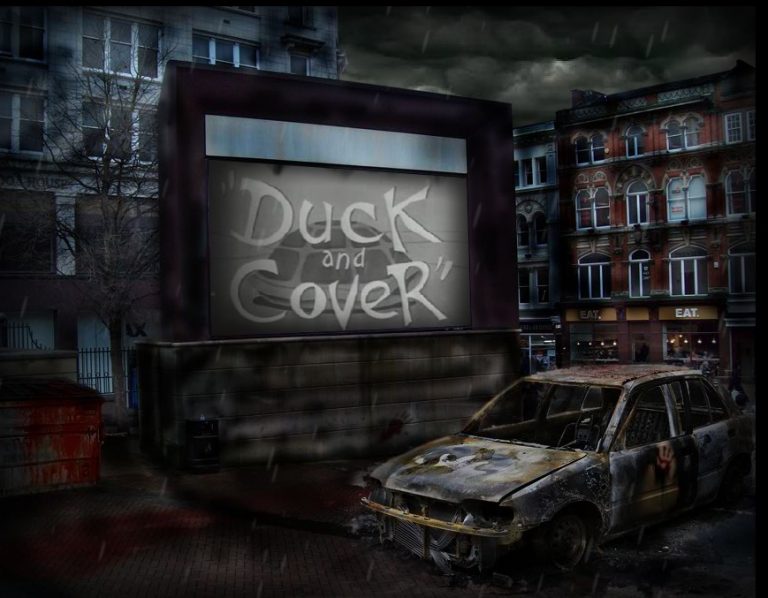
The house was just as he’d left it on Tuesday.
Ray pulled up on the drive. He paused before going into the house, needing to compose himself before he faced whatever was on the other side of the front door. He looked back over his shoulder around the quiet cul-de-sac where he and Marcia had lived for the last eleven years. It looked pretty much the same as it always had done, and yet everything felt uncomfortably different. This Wednesday evening had the stillness and silence of early Sunday morning. No one was around. Nothing moved. Nothing, that was, apart from Malcolm Worsley, his opposite neighbour. Worsley was dead, his corpse trapped in his front garden, hemmed in by the ornate shrubs and privet hedges he’d so lovingly tended for years.
The house was deathly quiet inside. ‘Marcia?’ he called out hopefully. ‘Marcia, are you here?’
She should have been in. She hadn’t been planning to go out on Tuesday morning as far as he was aware. He walked further down the hall. He instinctively took off his coat and shoes (otherwise she’d moan at him again), then stopped himself. It was as cold inside the house as it was out on the street.
‘Marcia?’
He checked the living room, dining room and kitchen and found them all empty, just as he’d left them. He then climbed the stairs, knowing his wife would most probably still have been in bed when it had happened, whatever it was. Christ, he hoped she was all right. But he knew she would have answered him by now. Ray prepared himself for the worst as he reached the landing. He could see into the bedroom. The duvet lay in a heap at the side of the bed. But Marcia wasn’t there. The bed was empty.
The carpet was sodden. Water had seeped out under the bathroom door and had spread along virtually the entire length of the landing. It was obvious now where Marcia was. Ray walked up to the bathroom, his feet squelching, and knocked on the door.
‘Marcia? Marcia, it’s me, love. I’m home…’
He tried the handle, but it was locked. He pushed and shoved at it to little effect before taking five or six splashing, sliding steps back down the landing, then running back at full pelt and shoulder-charging his way into the bathroom. The lock was weak and gave way instantly with Ray’s considerable weight slamming into it. He pushed the door open fully (sending a low wave of water rippling back across the tiled bathroom floor) and there, in front of him, stood what remained of his wife. Completely naked and completely unaware, she walked blindly towards him. He grabbed hold of her arms and held her wrists tight so she couldn’t move. Her eyes were dark and vacant and she felt ice-cold to the touch, her skin like wet rubber. He let her go then pressed himself back against the wall and watched in heartbroken silence as she lurched past, oblivious. She staggered the length of the landing and then crashed into the door of the spare bedroom.
Ray managed to drape a dressing gown over his wife’s shoulders then shut her in the third bedroom. He walked around the house methodically, locking and bolting every window and door. Wednesday night turned into Thursday morning as he busied himself around his home. The flood in the bathroom (Marcia had been running a bath when she’d died) had caused massive damage both upstairs and in the kitchen directly below. The cold water made the house smell of must, or perhaps that was just the stench of his decaying wife? Ray wasn’t sure. At least she’d left him with a bath full of water, he thought. That might prove useful.
Very occasionally, and only for the briefest of moments each time, Ray allowed himself to think about what had happened to the rest of the world. Had this happened everywhere? Despite his chosen vocation, thinking about other people was not something that came naturally to him and soon enough he’d concluded that his most sensible course of action was to continue to focus on his own safety, to sit tight and wait for help. Despite the fact that the electricity was off and the pressure in the taps was becoming increasingly weak, his house remained relatively comfortable and safe. There was a shop just around the corner where he could get food and drink supplies, and he still had the car if he needed to go any further afield. It made sense to stay at home. What use would he be to anyone else, anyway? One man to help hundreds, possibly even thousands? It would be far more sensible for him to concentrate on looking after himself. That was, after all, what he was best at.
A strange sense of normality gradually overtook Ray. Apart from making one hurried trip to the shop to fetch food early on Friday morning, he remained locked in his home from daybreak ’til dusk. He checked on Marcia a couple of times but there was no obvious change in her condition. He managed to get a loose dress over her head and shoulders, and eventually moved her to the garage to limit the noise her endless staggering around upstairs was making. She was constantly crashing into thing but he didn’t as get annoyed as he had with Shelly Bright. Marcia couldn’t help it.
With little else to do to occupy his time, Ray tried to make good the water damage to his home, but it was difficult to do anything without any power. He was actually relieved the electricity supply was off. It was safer that way. The light fitting in the kitchen was full of water from the overflowing bath. He’d drained as much of it off as he could. By the time the power comes back on, he decided, it’ll probably have dried out. He’d have to get someone to come out and look at the damage later. No doubt they’d charge a fortune…
On Friday evening Ray sat at his desk in the alcove in the dining room at the front of the house. He read books by candlelight until his eyelids began to droop. It was good to keep occupied and distracted. It was a relief to have something positive to do for a while. He was finding it increasingly difficult to deal with the silence and solitude of his dead world. After searching in the attic for a while he found an ancient-looking battery powered cassette player and used it to play a tape of loud classical music to drown out the quiet.
At a quarter to two on Saturday morning, Malcolm Worsley’s corpse finally escaped from his garden across the road and staggered over to Ray’s house. Worsley slammed against the window next to where Ray was sitting reading. Startled, he leapt up, his heart pounding. He quickly regained his composure when he realised it was only Malcolm and he watched as his dead neighbour pressed his disfigured face against the window, leaving behind a greasy smear. As he watched, Malcolm lifted a rotting hand and slapped it down on the glass. Strange, thought Ray as he watched the wizened shell of his dead friend hitting the glass again and again. It didn’t bother him unduly. In fact he felt quite sorry for Malcolm. The windows were double-glazed and that muffled each bang to little more than a dull thud. Tired, Ray turned up the volume on his cassette player and carried it upstairs with him to bed.
Saturday morning. Day five.
Ray had slept well. It would have been wrong to say he was happy with his situation but, all things considered, it could have been much, much worse. Regardless of what had happened to everyone else, he remained relatively safe and he was fairly warm and well protected. For a while he lay in bed and didn’t move, staring up at the ceiling and thinking about how everything had changed since this time last week.
What was he going to do today? He really needed to start thinking about getting more supplies in. He’d noticed earlier in the week that decorators had been working in one of the houses down the road when all this had started last Tuesday morning, and their van was still outside. Perhaps he could borrow it and drive around to the local supermarket? If he spent a little time today filling the van with absolutely everything he’d need, it would save him having to go out again for maybe as long as a couple of weeks. By then he was sure that his situation would have improved. It couldn’t get any worse, could it? In a couple of week’s time, he decided, the other people who had survived like him would start to coordinate themselves and get things organised.
Ray got up, wincing at the sudden drop in temperature when he swung his legs out from under the covers. Without the central heating working the house was icy cold. He tiptoed to the toilet (stepping gingerly over the still damp landing carpet) and relieved himself in the plastic bucket he’d been having to use since the cistern had dried up. Once a day he carried it down to the bottom of the garden and emptied the contents over his roses. That felt better, he thought as he shook himself dry and walked back to the bedroom to get dressed.
He was half-dressed and halfway down the stairs when he noticed how dark it was. Feeling slightly uneasy, but not overly concerned, he continued down.
He saw them at the front door first. Visible only as shifting shapes through the frosted glass, he could see the heads and shoulders of at least four corpses, maybe more. Unusual, he thought as he continued down, zipping up his trousers and tightening his belt. As it was every morning, his next port of call was the kitchen. Still half asleep, he walked barefoot across the cold, tiled floor and fetched himself some breakfast cereal from the cupboard next to the sink. The cupboard door slammed shut (the hinges were loose and needed tightening) and the sound echoed through the empty house like a gunshot. Ray cringed, then frowned. He could hear Marcia moving around in the garage. Was it just coincidence, or had his wife just reacted to noise for the first time since she’d died? He was about to go and see her when he caught sight of something in the dining room. Like the rest of the ground floor of the house this morning, that room also seemed darker than usual. He put his head around the door, then immediately pulled it back again. Bodies… loads of them. Fighting to stay calm, he peered through the narrow gap between the door and the frame and saw that the entire width of the wide bay window at the front of the house was packed tight with dead flesh. He could see countless ghastly faces pressed up against the glass, scouring the room with their dry, clouded eyes. Why were they here? What did they want? Ray couldn’t understand what was happening. None of the creatures had shown the slightest interest in him before, so why now? Were these somehow different to all the other bodies he’d so far seen? His mind wandered back to what had happened just before he’d gone to bed. Malcolm Worsley. That was it, that bugger Worsley had brought them here. He must have tipped them off that he was from the council. Did they think he’d be able to help them? Before he’d died Worsley had asked Ray to do favours for him on more than one occasion – everything from rushing through a planning application for an extension to his house to trying to get a parking fine overturned. Ray had no reason to think he would have changed his ways now just because he’d died. He peered through the gap again. There he was, the sly bugger, his dead face pressed hard against the window, letting everyone know where Ray was, wrongly assuming that he was the man who could (and would) help them.
His fragile confidence rattled, Ray felt uneasy. He ran back upstairs and peered out of the window in the spare room. Bloody hell, there were loads of them out there. A huge, ragged crowd of decomposing figures had gathered in front of his property. The nearest few corpses had been rammed up against the front of the house by the relentless pressure of countless others behind, and the whole mass had spilled out into the middle of the road. His car – his escape route – had been surrounded, swallowed up by the dead hordes.
The nervous councillor considered his suddenly limited options. Watching from behind the curtains, he saw more of the dark, shuffling shapes dragging themselves along the street towards his house. Individually they seemed weak and irrelevant and he had no reason to believe that they would do him any harm, but what could they do in these numbers? He never thought that his constituents would resort to mob rule to try and get action from the council. They’d never shown any interest before. He began to regret the day he’d stood for election.
Ray crept around to the back of the house and sat down on the edge of his bed. I’ll stay here and keep out of sight for a while, he thought. Maybe they’ll get tired waiting and go somewhere else.
By mid-afternoon the ever-growing crowd of bodies had filled the entire length of the street. They were hammering against the windows and door, and the sound could most probably be heard for miles around. Ray had finally plucked up enough courage to go back down and had quickly come to the conclusion that, as it looked as if he would be staying in the house longer than he’d originally expected, his supplies were far from sufficient. He only had enough food for a few more meals. Sitting well out of sight in the kitchen with his throat dry and his stomach rumbling, he came to the crushing realisation that because of the bloody public outside, his situation was now nowhere near as comfortable or safe as he’d originally thought. Dejected, he got up, walked across the room and went out to the garage to see Marcia. Maybe her condition would have improved today? Perhaps she’d be able to offer her husband some long-overdue support at this increasingly difficult time. No such luck. His dead wife was still crashing tirelessly around the room. Her dress was torn and she was naked again. Bloody hell, she looked awful: grossly overweight, body swollen in all the wrong places, unexpectedly limp-breasted… and to top it all, her skin had turned a dirty shade of blue-green. He wished she’d just stay still. As long as she was making this much noise, the people of Taychester would know there was someone in the house and would continue to beat a slow, but very definite, path to his door. Perhaps if he went in there and found a way of keeping her quiet? Christ, what was he thinking? He’d never been able to keep Marcia quiet when she was alive, how the hell was he supposed to get her to do it now?
Maybe he needed to get away and lie low for a while? But how was he going to get out and where was he supposed to go? He anxiously glanced at the clock on the wall. It was already gone two. In a few hours time the light would start to fade. He could either sit tight for another night or make his move today. He thought about the size of the crowd on the street. If there were hundreds of them out there now, how many more would there be tomorrow? Or the day after that, or the day after that? There was no way he alone could help so many people. More to the point, he didn’t want to. As their councillor he had a public duty to serve them but, as he had for most of his life in public office, he decided to turn his back on that responsibility and run.
Get some food, he thought, then get back underground. I’ll re-stock the bunker, get rid of the body, make myself comfortable, then wait for all of this to blow over.
Almost four o’clock. Exhausted and anxious, carrying a heavy holdall full of spare clothes, Councillor Cox approached the supermarket that he and Marcia usually shopped at. He’d had to walk. His way out of the front of his house blocked, he’d instead sneaked out the back and climbed over the fence at the bottom of the garden. Bloody hell, some of the public had been waiting for him there too! He’d found himself in the middle of a crowd of between twenty and thirty of them. He’d tried to reason with them, tried to make them see there was nothing he could do to help so many of them, but they wouldn’t listen. To his shame he’d pushed and barged his way through the crowd in tears, unable to get away quick enough.
The supermarket was as desolate as everywhere else. That pleased Ray. He was sick of the way what remained of the population gravitated towards him whenever they saw him. He wished they’d just leave him alone. Didn’t they know that he had problems too? Who was going to help him out? Just because he wasn’t as sick as they obviously were, it didn’t mean he was able to run to the aid of every person who happened to see him. As he neared the building he could see a few people swarming around the front entrance doors. He decided to try and get in through the back. The loading bay was a much quieter option.
Ray weaved through the abandoned lorries, trolleys and carts at the back of the huge store, then worked his way through the bakery and into the main part of the shop. Bloody hell, the place smelled rank. The council health and safety department would have had a field day. A week’s worth of rotting food and rotting flesh had combined to leave a smell so strong it made him gag. Stay calm Ray, he told himself, you can do this. Get everything you need here then shut yourself away for as long as it takes for this bloody mess to sort itself out. It’s not all down to you.
Two bodies staggered towards him. Ray turned when he heard one of them crash into a display of boxes of crisps, stacked up like a pyramid.
‘Leave me alone,’ he hissed at them, loud enough for them to hear but not so loud that the rest of the dead shoppers would notice. ‘I can’t help you. There’s nothing I can do for any of you…’ But they kept coming. What didn’t they understand? ‘Look, I’m really sorry. I’m sure someone will be along soon who’ll be able to help, but it’s not me. I’m just here to get some food then I’m leaving. You’re not the only ones with problems, you know.’
The corpses were undeterred. The nearest of them was just a couple of metres away now and its relentless, slothful approach unnerved Ray. He went down another aisle to try and get over to the other side of the building, but there were more of them waiting for him there. Panic rising, he looked around and could see them dragging themselves towards him from just about every direction; creeping up the aisles, crawling over empty cardboard boxes and piles of spoiled food… he could see more than twenty of them now, and more were beginning to come in through the supermarket’s open entrance doors. In desperation and exacerbation he climbed up onto the lid of the nearest of a row of chest freezers full of defrosted food to both address the advancing public and get out of their reach. He needed to put these people straight once and for all.
‘Stop!’ he yelled, his voice echoing around the cavernous building and attracting the attention of the few remaining bodies who hadn’t yet noticed him. ‘Just leave me alone, will you? There’s nothing I can do for any of you. Go away!’
In his confused, misguided state, Ray failed to appreciate the stupidity of his actions. With renewed interest the corpses surged towards him now. As the closest reached out and grabbed at him with numb hands, he scrambled back across the row of freezers. One of them – the fourth in line – was open but he didn’t notice until it was too late. He slipped and he fell into it, sinking deep into a mushy sludge of soaked cardboard boxes and rotting quiches, pizzas and lasagnes. The sudden drop meant he was now face to face with the dead; eye level with what was left of the people of the borough of Taychester. The same people who used to use the tennis courts and football pitches that he had responsibility for, the same people whose lives were shaped in the council meetings he slept through. Ray tried to get up again but lost his footing and slipped deeper into the soggy mire. Terrified, he reached out and grabbed hold of the shoulders of the nearest cadaver and hauled himself up, using the body for support. He clung onto it as he climbed out, and stared into its face, hideously distorted by decay. But there was something about it… the shape of its wiry frame, the lank white hair which hung listlessly from its scalp… It reminded him of his mother. He’d buried mother more than five years ago though, so there was no way it could have been her—
—the body threw itself at him. Distracted, he was knocked off-balance. It tried to force its claw-like hands up closer to his face. He panicked and tried to push the foul thing away again but it managed to slash at his jacket, its fingers snagging on his lapel, tearing one of its nails clean off. He gagged with disgust as he picked off the nail and flicked it away, then ducked to one side as the body came at him again. Another corpse behind him did the same and the two cadavers grabbed each other when they both missed him. He dropped down as they scrabbled above him, clawing at each other, half-fighting, half-trying to get away.
On his hands and knees, crawling through ice-cold, foul-smelling water and muck, he weaved through the vast forest of unsteady legs surrounding him. The people didn’t seem to see him down there, so he kept moving.
Councillor Cox crawled out of the supermarket. Soaking wet. Smelling of decay. Panic-struck. Terrified. Ashamed.
Ray arrived back at the council house in a supermarket-branded home delivery van. It had some food in the back, and he hoped that would be enough because there was no way he was going back there again. He slammed on the brakes when he reached the civic square and looked around anxiously, checking ahead and in his mirrors. Already more of the people of the borough were heading his way from all directions. Would they never stop? He’d only been stationary for a couple of seconds and already they were swarming around the van, banging and hammering angrily on its sides, demanding he help them. He edged the vehicle forward, hoping to nudge them out of the way, but they just stood there defiant and stared at him. In temper he slammed his foot down on the accelerator and tore through the lot of them.
Into the car park. Down the ramp. Round and round and down until he reached Level 2. He reversed the van close to the open bunker door and ran into the underground shelter. It was still empty, thank God, except for the body in the dormitory, of course. Too scared to stop and think about what he was doing Ray crashed through the bunker then yanked the dormitory door open. Shelly Bright’s corpse, now looking particularly grotesque and discoloured, lunged at him at the same time that he lunged at her. The councillor and the corpse both fell heavily to the ground. Ray scrambled back up onto his feet first and then, with utter contempt and total lack of respect, he grabbed a handful of Shelly’s hair and pulled her back towards the door. A clump of skin came free and she crawled away, a raw bald patch left just above her forehead. Ray lunged at her again and caught her in a tight neck-lock. Panting heavily, he dragged the kicking and squirming dead payroll clerk out of the bunker and threw her into the car park.
There were other people close now. It looked like hundreds of them coming towards him, their speed exaggerated by gravity and the downwards concrete slope. Some fell and rolled down the ramp, their clumsy bodies temporarily obstructing others. Obviously attracted by the noise he’d made returning to the bunker, he could see even more of them spilling into the car park, desperate for his help.
‘Bloody hell,’ Ray whimpered as Shelly Bright’s foul, hairless corpse lunged for him again. This time he angrily shoved her away to one side, not even giving her a second glance as she bounced off the wall, collapsed, then picked herself up and started towards him again. He’d wanted to get the salvageable food from the back of the van but he knew he didn’t have time to do it now, there were just too many of them about. Maybe he’d be able to come back out in a couple of hour’s time when the excitement had died down and the bodies had disappeared. He remembered the ever-increasing size of the crowd of corpses outside his house and tried to convince himself that this would be different. They wouldn’t stay down here in the darkness waiting for him indefinitely, would they?
Shelly Bright hurled herself at him yet again. There was another body almost as close now, and another… He had to move.
Ray Cox looked around at the decayed faces of the people of Taychester one last time – all of them seeming to be silently demanding he provide answers to their unanswerable questions – before scurrying back into the bunker and sealing the door.
No sign of them disappearing yet. Every so often I try and open the door a little bit to see what’s going on. It’s been three days now and they’re still all waiting for me. It looks like the whole car park is full now. How the hell am I ever going to get out? Maybe it’s the noise of the generator and the air conditioning pumps that’s attracting them, but I can’t turn them off, can I? I’ll just have to sit here and wait. They’ll get bored eventually, won’t they?
I try not to think too much about what’s happened because I don’t understand it and I don’t think I ever will. All that matters now is getting through it in one piece. I don’t mind spending a little more time down here on my own. I’ve spent years keeping a low profile. It won’t be much longer. Just a few more days. A couple of weeks at the most.
Duck and Cover. It has to work, doesn’t it? Stay down long enough and you’ll be okay. I’ll stay here until this has all blown over.

